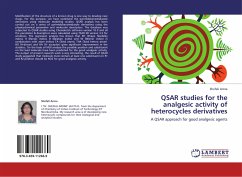Obesity is one of the most serious public health problems of the 21st century, increasing prevalence in adults and children [1]. The central nervous system (CNS) [2] has developed an interconnected circuitry to keep us fed and in an sufficient nutritional state. One of these results is that an energy-dense environment favors the development of obesity. Neuropeptide Y (NPY) is a 36 amino acid peptide which is widely distributed in both the central nervous system and in peripheral neurones and has a range of biological actions such as control of food intake and body weight. In recent year, there have been many researches with NPY receptor subtypes (Y1, Y2, Y4, Y5 and Y6) to treat human obesity in literature. In this study, quantitative structure activity relationship (QSAR) studies have been performed with a series of carbazole derivatives [6] as NPY Y1 antagonists (Figure 1) to elucidate the role of NPY Y1 receptor and evaluate the potential of such agents to treat obesity in man.I would like to thank Natalia Tutelea for her help and support and LAP LAMBERT Academic Publishing for converting my study into a book.
Bitte wählen Sie Ihr Anliegen aus.
Rechnungen
Retourenschein anfordern
Bestellstatus
Storno








